Nursultan Nazarbayev
Nursultan Äbishuly Nazarbayev[2][note 2] (born 6 July 1940) is a Kazakh politician currently serving as the Chairman of the Security Council of Kazakhstan who previously served as the first President of Kazakhstan, in office from 24 April 1990[3] until his formal resignation on 19 March 2019.[4] He is one of the longest-served non-royal leaders in the world, having ruled Kazakhstan for nearly three decades. He was named First Secretary of the Communist Party of the Kazakh SSR in 1989 and was elected as the nation's first president following its independence from the Soviet Union. He holds the title "Leader of the Nation".[5] In April 2015, Nazarbayev was re-elected with almost 98% of the vote, as he ran virtually unopposed.[6]
Nursultan Nazarbayev | |
|---|---|
Нұрсұлтан Назарбаев Nursultan Nazarbaev | |
_(cropped).jpg) Nazarbayev in 2020 | |
| Chairman of the Security Council of Kazakhstan | |
| Assumed office 21 August 1991 | |
| President | Himself Kassym-Jomart Tokayev |
| Preceded by | Office established |
| 1st President of Kazakhstan | |
| In office 24 April 1990[note 1] – 20 March 2019 | |
| Prime Minister | See list
|
| Vice President | Yerik Asanbayev (1991–96) |
| Preceded by | Office established |
| Succeeded by | Kassym-Jomart Tokayev |
| Honorary President of Turkic Council[1] | |
| Assumed office 25 April 2019 | |
| Preceded by | Office established |
| Member of the Constitutional Council | |
| Assumed office 19 March 2019 | |
| Preceded by | Office established |
| Chairman of the Assembly of People | |
| Assumed office 1 March 1995 | |
| Preceded by | Office established |
| Chairman of Nur Otan | |
| Assumed office 1 March 1999 | |
| Preceded by | Office established |
| First Secretary of the Central Committee of the QKP | |
| In office 22 June 1989 – 7 September 1991 | |
| Preceded by | Gennady Kolbin |
| Succeeded by | Office abolished |
| Chairman of the Supreme Soviet of the Kazakh SSR | |
| In office 22 February 1990 – 24 April 1990 | |
| Prime Minister | Uzakbay Karamanov |
| Prime Minister of the Kazakh SSR | |
| In office 22 March 1984 – 27 July 1989 | |
| Chairman | Bayken Ashimov Salamay Mukashev Zakash Kamaledinov Vera Sidorova Makhtay Sagdiyev |
| Preceded by | Kilibay Medeubekov |
| Succeeded by | Yerik Asanbayev |
| Preceded by | Bayken Ashimov |
| Succeeded by | Uzakbay Karamanov |
| Personal details | |
| Born | Nursultan Ábishuly Nazarbayev 6 July 1940 Chemolgan, Kazakh SSR, Soviet Union (now Ushkonyr, Kazakhstan) |
| Political party | Nur Otan (1999–present) |
| Other political affiliations | Communist (1962–1991) Independent (1991–1999) |
| Spouse(s) | |
| Children | Dariga Dinara Aliya |
| Signature | |
| Website | https://elbasy.kz/en |
| Military service | |
| Allegiance | |
| Branch/service | Armed Forces of the Republic of Kazakhstan |
| Years of service | 1991–2019 |
| Rank | Supreme Commander |
Nazarbayev has been accused of human rights abuses by several human rights organisations and suppressed dissent and presided over an authoritarian regime.[7] No election held in Kazakhstan since independence has been judged to be free or fair by the West.[7][8] In 2010, he announced reforms to encourage a multi-party system.[7] In January 2017, Nazarbayev proposed constitutional reforms that would delegate powers to the Parliament of Kazakhstan.[9]
Early life and education
.jpg)
Nazarbayev was born in Chemolgan, a rural town near Almaty, when Kazakhstan was one of the republics of the Soviet Union to the parents of Abish Nazarbayev (1903–1971) and Aljan Nazarbayeva (1910–1977).[10] His father Abish was a poor laborer who worked for a wealthy local family until Soviet rule confiscated the family's farmland in the 1930's during Joseph Stalin's collectivization policy.[11] Following this, his father took the family to the mountains to live out a nomadic existence.[12] His family's religious tradition was Sunni Islam.
Abish, avoided compulsory military service due to a withered arm he had sustained when putting out a fire.[13] At the end of World War II the family returned to the village of Chemolgan, and Nazarbayev began to learn the Russian language.[14] He performed well at school, and was sent to a boarding school in Kaskelen.[15]
After leaving school, Nazarbayev took up a one-year, government-funded scholarship at the Karaganda Steel Mill in Temirtau.[16] He also spent time training at a steel plant in Dniprodzerzhynsk, and therefore was away from Temirtau when riots broke out there over working conditions.[16] By the age of twenty, he was earning a relatively good wage doing "incredibly heavy and dangerous work" in the blast furnace.[17]
Nazarbayev joined the Communist Party in 1962, becoming a prominent member of the Young Communist League (Komsomol)[17] and full-time worker for the party, and attended the Karagandy Polytechnic Institute.[18] He was appointed secretary of the Communist Party Committee of the Karaganda Metallurgical Kombinat in 1972, and four years later became Second Secretary of the Karaganda Regional Party Committee.[18]
In his role as a bureaucrat, Nazarbayev dealt with legal papers, logistical problems, and industrial disputes, as well as meeting workers to solve individual issues.[18] He later wrote that "the central allocation of capital investment and the distribution of funds" meant that infrastructure was poor, workers were demoralised and overworked, and centrally set targets were unrealistic; he saw the steel plant's problems as a microcosm for the problems for the Soviet Union as a whole.[19]
Rise to power
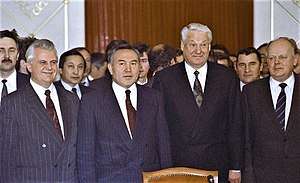
In 1984, Nazarbayev became the Prime Minister of Kazakhstan (Chairman of the Council of Ministers), under Dinmukhamed Kunayev, the First Secretary of the Communist Party of Kazakhstan.[20] At the sixteenth session of the Communist Party of Kazakhstan in January 1986, Nazarbayev criticized Askar Kunayev, head of the Academy of Sciences, for not reforming his department. Dinmukhamed Kunayev, Nazarbayev's boss and Askar's brother, felt deeply angered and betrayed. Kunayev went to Moscow and demanded Nazarbayev's dismissal while Nazarbayev's supporters campaigned for Kunayev's dismissal and Nazarbayev's promotion.
Kunayev was ousted in 1986 and replaced by a Russian, Gennady Kolbin, who despite his office had little authority in Kazakhstan. Nazarbayev was named party leader on 22 June 1989,[20] only the second Kazakh (after Kunayev) to hold the post. He was Chairman of the Supreme Soviet (head of state) from 22 February to 24 April 1990.
On 24 April 1990, Nazarbayev was named the first President of Kazakhstan by the Supreme Soviet. He supported Russian President Boris Yeltsin against the attempted coup in August 1991 by Soviet hardliners.[21] Nazarbayev was close enough to Soviet leader Mikhail Gorbachev for Gorbachev to consider him for the post of Vice President of the Soviet Union; however, Nazarbayev turned the offer down.[22]
The Soviet Union disintegrated following the failed coup, though Nazarbayev was highly concerned with maintaining the close economic ties between Kazakhstan and Russia.[23] In the country's first presidential election, held on 1 December, he appeared alone on the ballot and won 95% of the vote.[24] On 21 December, he signed the Alma-Ata Protocol, taking Kazakhstan into the Commonwealth of Independent States.[25]
Presidency
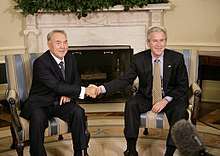
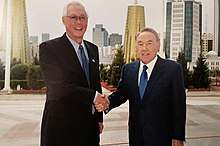

Nazarbayev renamed the former State Defense Committees as the Ministry of Defense and appointed Sagadat Nurmagambetov as Defense Minister on 7 May 1992. The Supreme Council, under the leadership of Chairman Serikbolsyn Abdilin, began debating over a draft constitution in June 1992. The constitution created a strong executive branch with limited checks on executive power.[26]
Opposition political parties Azat, Jeltoqsan and the Republican Party, held demonstrations in Almaty from 10–17 June calling for the formation of a coalition government and the resignation of the government of Prime Minister Sergey Tereshchenko and the Supreme Council. The Parliament of Kazakhstan, composed of Communist Party legislators who had yet to stand in an election since the country gained independence, adopted the constitution on 28 January 1993.[26]
An April 1995 referendum extended Nazarbayev's term until 2000. He was re-elected in January 1999 and again in December 2005. The Organization for Security and Cooperation in Europe criticized the last presidential election as falling short of international democratic standards.[27] On 18 May 2007, the Parliament of Kazakhstan approved a constitutional amendment which allowed the incumbent president—himself—to run for an unlimited number of five-year terms. This amendment applied specifically and only to Nazarbayev: the original constitution's prescribed maximum of two five-year terms will still apply to all future presidents of Kazakhstan.[28]
Nazarbayev appointed Altynbek Sarsenbayev, who at the time served as the Minister of Culture, Information and Concord, the Secretary of the Kazakh Security Council, replacing Marat Tazhin, on 4 May 2001. Tazhin became the Chairman of the National Security Committee, replacing Alnur Musayev. Musayev became the head of the Presidential Security Service.[29]
Notwithstanding Kazakhstan's membership in the Organisation of the Islamic Conference (now the Organisation of Islamic Cooperation), under Nazarbayev the country has had good relations with Israel. Diplomatic relations were established in 1992, and President Nazarbayev paid official visits to Israel in 1995 and 2000.[30] Bilateral trade between the two countries amounted to US$724,000,000 in 2005.
In 1994, Nazarbayev suggested relocating the capital city from Almaty to Astana, and the official changeover of the capital happened on 10 December 1997.[31]
On 4 December 2005, new presidential elections were held and President Nazarbayev won by an overwhelming majority of 91.15% (from a total of 6,871,571 eligible participating voters). Nazarbayev was sworn in for another seven-year term on 11 January 2006.[32] In 2009, former UK Cabinet Minister Jonathan Aitken released a biography of the Kazakh leader entitled Nazarbayev and the Making of Kazakhstan. The book takes a generally pro-Nazarbayev stance, asserting in the introduction that he is mostly responsible for the success of modern Kazakhstan.[33]
Nazarbayev has always emphasised the role of education in the nation's social development. In order to make education affordable, on 13 January 2009, he introduced educational grant "Orken" for the talented youth of Kazakhstan. This decree was amended on 23 September 2016.[34]
In December 2011, opponents of Nazarbayev rioted in Mangystau, described by the BBC as the biggest opposition movement of his time in power.[35] On 16 December 2011, demonstrations in the oil town of Zhanaozen clashed with police on the country's Independence Day.[36] Fifteen people were shot dead by security forces[37] and almost 100 people were injured. Protests quickly spread to other cities but then died down. The subsequent trial of demonstrators uncovered mass abuse and torture of detainees.[35]
On 11 June 2011, Daniel Witt, Vice Chairman of the Eurasia Foundation, acknowledged the role of Nazarbayev and his political reforms:
"[President] Nazarbayev has led Kazakhstan through difficult times and into an era of prosperity and growth. He has demonstrated that he values his U.S. and Western alliances and is committed to achieving democratic governance."[38]
In December 2012, Nazarbayev outlined a forward-looking national strategy called the Kazakhstan 2050 Strategy.[39]
In 2014, Nazarbayev suggested that Kazakhstan should change its name to "Kazakh Yeli" ("Country of the Kazakhs"), for the country to attract better and more foreign investment, since "Kazakhstan" by its name is associated with other "-stan" countries. Nazarbayev noted Mongolia receives more investment than Kazakhstan because it is not a "-stan" country, even though it is in the same neighborhood, and not as stable as Kazakhstan. However, he is letting the people decide on whether the country should change its name.[40][41]
Allegations of corruption
.jpg)
Over the course of Nazarbayev's presidency, an increasing number of accusations of corruption and favoritism have been directed against Nazarbayev and his circle. Critics say that the country's government has come to resemble a clan system.[42]
According to The New Yorker, in 1999 Swiss banking officials discovered $85,000,000 in an account apparently belonging to Nazarbayev; the money, intended for the Kazakh treasury, had in part been transferred through accounts linked to James Giffen.[43] Subsequently, Nazarbayev successfully pushed for a parliamentary bill granting him legal immunity, as well as another designed to legalise money laundering, angering critics further.[43] When Kazakh opposition newspaper Respublika reported in 2002 that Nazarbayev had in the mid-1990s secretly stashed away $1,000,000,000 of state oil revenue in Swiss bank accounts, the decapitated carcass of a dog was left outside the newspaper's offices, with a warning reading "There won't be a next time"; the dog's head later turned up outside editor Irina Petrushova's apartment, with a warning reading "There will be no last time."[44][45][46] The newspaper was firebombed as well.[46]
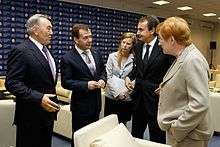
In May 2007, the Parliament of Kazakhstan approved a constitutional amendment which would allow Nazarbayev to seek re-election as many times as he wishes. This amendment applies specifically and only to Nazarbayev, since it states that the first president will have no limits on how many times he can run for office, but subsequent presidents will be restricted to a five-year term.[47]
As of 2015, Kazakhstan has never held an election meeting international standards.[7][8]
In May 2018, the Parliament of Kazakhstan passed a constitutional amendment allowing Nazarbayev to serve as Chairman of the Security Council for life. These reforms, which were approved by the Constitutional Council on 28 June, also expanded the powers of the Security Council, granting it the status of a constitutional body. The amendment states that, "The decisions of the security council and the chairman of the security council are mandatory and are subject to strict execution by state bodies, organisations and officials of the Republic of Kazakhstan."[48]
Economic issues
Eurasian Economic Union
In 1994, Nazarbayev suggested the idea of creating a "Eurasian Union" during a speech at Moscow State University.[49][50][51] On 29 May 2014, Russia, Belarus, and Kazakhstan signed a treaty to create a Eurasian Economic Union which created a single economic space of 170,000,000 people and came into effect in January 2015.[52] Nazarbayev said shortly after the treaty was signed, "We see this as an open space and a new bridge between the growing economies of Europe and Asia."[52] Nazarbayev named Honorary Chairman of Supreme Eurasian Economic Council in May 2019.[53]
Kazakhstan 2050 Strategy
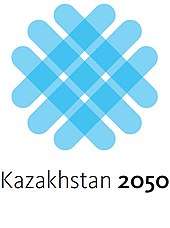
Nazarbayev unveiled in his 2012 State of the Nation the Kazakhstan 2050 Strategy, a long-term strategy to ensure future growth prospects of Kazakhstan, and position Kazakhstan as one of the 30 most developed nations in the world.[54]
Nurly Zhol
President Nazarbayev unveiled in 2014 a multibillion-dollar domestic modernisation and reformation plan called Nurly Zhol - The Path to the Future.[55]
Digital Kazakhstan
President Nazarbayev unveiled this technological modernization initiative to increase Kazakhstan's economic competitiveness through the digital ecosystem development.[56]
Environmental issues
In his 1998 autobiography, Nazarbayev wrote that "The shrinking of the Aral Sea, because of its scope, is one of the most serious ecological disasters being faced by our planet today. It is not an exaggeration to put it on the same level as the destruction of the Amazon rainforest."[57] He called on Uzbekistan, Turkmenistan, Tajikistan, Kyrgyzstan, and the wider world to do more to reverse the environmental damage done during the Soviet era.[58]
Stance on Nuclear weapons
Kazakhstan inherited from the Soviet Union the world's fourth-largest stockpile of nuclear weapons. Within four years of independence, Kazakhstan possessed zero nuclear weapons.[59] In one of the new government's first major decisions, Nazarbayev closed the Soviet nuclear test site at Semipalatinsk (Semei), where 456 nuclear tests had been conducted by the Soviet military.[60]
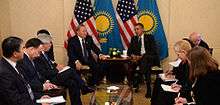
During the Soviet era, over 500 military experiments with nuclear weapons were conducted by scientists in the Kazakhstan region, mostly at the Semipalatinsk Test Site, causing radiation sickness and birth defects.[61] As the influence of the Soviet Union waned, Nazarbayev closed the site.[62] He later claimed that he had encouraged Olzhas Suleimenov's anti-nuclear movement in Kazakhstan, and was always fully committed to the group's goals.[63] In what was dubbed "Project Sapphire", the Kazakhstan and United States governments worked closely together to dismantle former Soviet weapons stored in the country, with the Americans agreeing to fund over $800,000,000 in transportation and "compensation" costs.[64]
Nazarbayev encouraged the United Nations General Assembly to establish 29 August as the International Day Against Nuclear Tests. In his article he has proposed a new Non-Proliferation Treaty "that would guarantee clear obligations on the part of signatory governments and define real sanctions for those who fail to observe the terms of the agreement."[65] His foreign minister signed a treaty authorising the Central Asian Nuclear Weapon Free Zone on 8 September 2006.[66]
In an oped in The Washington Times, Nazarbayev called for the Nuclear Non-proliferation Treaty to be modernised and better balanced.[67]
In March 2016, Nazarbayev released his "Manifesto: The World. The 21st century."[68] In this manifest the Kazakhstan President called for expanding and replicating existing nuclear-weapon-free zones and stressed the need to modernise existing international disarmament treaties.[69]
Iran
In a speech given in December 2006 marking the fifteenth anniversary of Kazakhstan's independence, Nazarbayev stated he wished to join with Iran in support of a single currency for all Central Asian states and intended to push the idea forward with the President of Iran, Mahmoud Ahmadinejad, on an upcoming visit. The Kazakh president also reportedly criticised Iran as a terrorism-supporting state. The Kazakh Foreign Ministry released a statement on 19 December, saying the reports were mistaken and contradictory to what the president actually meant.[70]
Religion
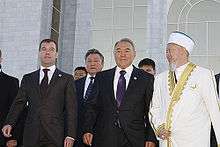
Nazarbayev put forward the initiative of holding a forum of world and traditional religions in Astana. Earlier the organisers of similar events were only representatives of leading religions and denominations. Among other similar events aimed at establishing interdenominational dialogue were the meetings of representatives of world religions and denominations held in Assisi, Italy, in October 1986 and January 2002.[71] The first Congress of World and Traditional Religions which gathered in 2003 allowed the leaders of all major religions to develop prospects for mutual cooperation.
Nazarbayev initially espoused anti-religious views during the Soviet era;[72] he later made attempts to support Muslim heritage by performing the Hajj pilgrimage,[72] and supporting mosque renovations.[73]
Under the leadership of Nazarbayev, the Republic of Kazakhstan enacted some degrees of multiculturalism in order to retain and attract talents from diverse ethnic groups among its citizenry, and even from nations that are developing ties of cooperation with the country, in order to coordinate human resources onto the state-guided path of global market economic participation. This principle of the Kazakh leadership has earned it the name "Singapore of the Steppes".[74]
However, in 2012 Nazarbayev proposed reforms, which were later enacted by the parliament, imposing stringent restrictions on religious practices.[75] Religious groups were required to re-register, or face closure.[76] The initiative was explained as an attempt to combat extremism. However, under the new law, many minority religious groups are deemed illegal. In order to exist on a local level, a group must have more than 50 members: more than 500 on a regional level, and more than 5,000 on the national level.[75]
Nazarbayev made critical remarks against the veil, choosing to highlight Turkic traditions over Islam by claiming that "We are Turks, not Arabs" in an open reference to the Turkic heritage while attacking Arab heritage.
Nationalism
In 2014, Vladimir Putin's remarks regarding the historicity of Kazakhstan, in which he stated that Nazarbayev "created a state on a territory that never had a state ... Kazakhs never had any statehood, he has created it"[77][78][79][80][81][82] led to a severe response from Nazarbayev.[83][84][85][86][87][88][89][90][91]
In February 2018, Reuters reported that "Kazakhstan further loosened cultural ties with its former political masters in Moscow ... when a ban on speaking Russian in cabinet meetings took effect ... [Nazarbayev] has also ordered all parliamentary hearings to be held in Kazakh, saying those who are not fluent must be provided with simultaneous translations."[92]
Human rights record
Kazakhstan's human rights situation under Nazarbayev is uniformly described as poor by independent observers. Human Rights Watch says that "Kazakhstan heavily restricts freedom of assembly, speech, and religion. In 2014, authorities closed newspapers, jailed or fined dozens of people after peaceful but unsanctioned protests, and fined or detained worshippers for practicing religion outside state controls. Government critics, including opposition leader Vladimir Kozlov, remained in detention after unfair trials. In mid-2014, Kazakhstan adopted new criminal, criminal executive, criminal procedural, and administrative codes, and a new law on trade unions, which contain articles restricting fundamental freedoms and are incompatible with international standards. Torture remains common in places of detention."[93]
Kazakhstan is ranked 161 out of 180 countries on the World Press Freedom Index, compiled by Reporters Without Borders.[94]
Rule of law
According to a US government report released in 2014, in Kazakhstan:
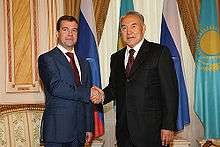
The law does not require police to inform detainees that they have the right to an attorney, and police did not do so. Human rights observers alleged that law enforcement officials dissuaded detainees from seeing an attorney, gathered evidence through preliminary questioning before a detainee’s attorney arrived, and in some cases used corrupt defense attorneys to gather evidence. [...] The law does not adequately provide for an independent judiciary. The executive branch sharply limited judicial independence. Prosecutors enjoyed a quasi-judicial role and had the authority to suspend court decisions. Corruption was evident at every stage of the judicial process. Although judges were among the most highly paid government employees, lawyers and human rights monitors alleged that judges, prosecutors, and other officials solicited bribes in exchange for favorable rulings in the majority of criminal cases.[95]
Kazakhstan's global rank in the World Justice Project's 2015 Rule of Law Index was 65 out of 102; the country scored well on "Order and Security" (global rank 32/102), and poorly on "Constraints on Government Powers" (global rank 93/102), "Open Government" (85/102) and "Fundamental Rights" (84/102, with a downward trend marking a deterioration in conditions).[96]
The National plan "100 concrete steps" introduced by President Nazarbayev included measures to reform the court system of Kazakhstan. The implementation of the national plan resulted in Kazakhstan's transition from a five-tier judicial system to a three-tier one in early 2016.[97]
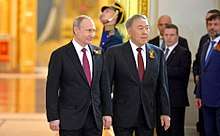
Foreign policy
During Nazarbayev's presidency the main principle of Kazakhstan's international relations was multi-vector foreign policy, which was based on initiatives to establish friendly relations with foreign partners.[98] Kazakhstan under Nazarbayev became co-founders of the Shanghai Cooperation Organisation in 2001.[99] U.S. President-elect Donald Trump lauded Nazabayev's leadership and called Kazakhstan's achievements under his presidency a "miracle" during their phone call on 30 November 2016.[100]
Israeli Prime Minister Benjamin Netanyahu conducted his first ever visit to Kazakhstan in mid-December 2016, when he met with Nazarbayev. The two countries signed agreements on research and development, aviation, civil service commissions and agricultural cooperation, as well as a declaration on establishing an agricultural consortium.[101]
_31.jpg)
In January 2019, Zimbabwean President Emmerson Mnangagwa conducted a state visit to Astana to meet with Nazarbayev, in the first visit by an African leader to the country in years. This would be the last foreign head of state that Nazarbayev would receive while in office.[102] Nazarbayev's last state visit to a foreign country took place five days prior to his resignation, with his visit to the United Arab Emirates to meet Crown Prince Mohammed bin Zayed.[103]
Resignation
On 19 March 2019, following unusually persistent protests in cities across the country,[104] Nazarbayev announced his resignation as President of Kazakhstan, citing the need for "a new generation of leaders".[4] The announcement was broadcast in a televised address in Astana after which he signed a decree ending his powers from 20 March 2019.[4] Kassym-Jomart Tokayev, speaker of the upper house of parliament, was appointed as president of the country until the end of the presidential term.[4]
His resignation as President notwithstanding, he continues to head the ruling Nur Otan Party, remains a member of the Constitutional Council, and keeps his lifetime post as chairman of the Security Council. In his televised address Nazarbayev pointed out that he had been granted the honorary status of elbasy (leader of the nation, leader of the people[note 3]), the title bestowed upon him by parliament in 2010.[104][105]
Various colleagues of Nazarbayev reacted within hours of the announcement, with Uzbek President Shavkat Mirziyoyev holding a telephone conversation with Nazarbayev, calling him a "great politician".[106][107] In a cabinet meeting, Russian President Vladimir Putin praised Nazarbayev's leadership, even going as far to say that the Eurasian Economic Union was Nazarbayev's "brainchild".[108] Other world leaders who sent messages to Nazarbayev included Ilham Aliyev, President of Azerbaijan,[109] Alexander Lukashenko, President of Belarus, and Emomali Rahmon, President of Tajikistan.
Post-presidency
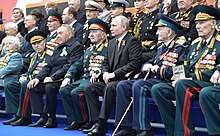
According to The Economist, despite his resignation, he is still behind the leadership of the country.[112] His resignation is considered by The Moscow Times to be an attempt to turn him into a Lee Kuan Yew type of public figure.[113] In the month since his resignation, he had met with South Korean President Moon Jae In and Hungarian Prime Minister Viktor Orban during their visit to Kazakhstan. Notably, their meetings with Nazarbayev took place separately from their meetings with President Tokayev, who is the de jure head of state. Two days after leaving office, he attended the Nauryz celebrations where he was greeted by the civilian population.[114] In regard to accommodations as the first president, it is known that his personal office (now known as Kokorda) has been moved to a different location in the capital from the presidential palace. It was also reported in late April 2019 that Nazarbayev also maintains a private jet for official and private visits.[115]
He has embarked on two foreign visits since leaving office, to Beijing and Moscow. The former visit took place during the second Belt and Road Forum[116] while the latter took place during the 2019 Moscow Victory Day Parade.[117][118] In late-May, Mevlüt Çavuşoğlu announced the naming of Nazarbayev as the honorary President of the Turkic Council.[119] On 7 September, he visited Moscow once again to attend the Moscow City Day celebrations on the VDNKh and to open his pavilion at the trade show.[120] During a visit to the Azerbaijani capital of Baku, he told the hosting President Ilham Aliyev that his father, former President Heydar Aliyev, would be "very delighted" with the development of the capital.[121] In late October, he attended the Enthronement of Japanese emperor Naruhito as the representative of Kazakhstan.[122][123] During this visit, he met with Ukrainian President Volodymyr Zelensky, during which he congratulated him on his election victory and was invited by Zelensky to visit Kiev.[124][125][126] Nazarbayev met with Spanish tennis player Rafael Nadal during his visit to Kazakhstan for a charity tennis match. During his meeting with Nadal, he personally called former Spanish King Juan Carlos I.[127][128] In October 2019, it was announced that all potential ministerial candidates needed the approval of Nazarbayev before being appointed by Tokayev, with the exception of Minister of Defence, Interior Minister and Foreign Minister.[129]
On 29 November 2019, Nursultan Nazarbayev was named the Honorary Chair of Central Asian Consultative Meeting. It was announced at the second Consultative Meeting of the Heads of State of Central Asia in Tashkent, Uzbekistan.[130]
COVID-19
Nazarbayev created the Biz Birgemiz ("We are Together" in Kazakh) Fund in March 2020 “to fight the pandemic COVID-19 effectively while supporting the economy.”[131] As of June 2020, the fund gathered over 28 billion tenge (US$69.3 million) to provide financial aid to more than 470,000 families in 23 cities as part of the fund’s three waves of assistance.[131] Upon his diagnosis with COVID-19 in mid-June, he received calls and telegrams of support from world leaders, including Vladimir Putin and King Abdullah II of Jordan[132] as well as former President of Croatia Stjepan Mesić.[133]
80th birthday
He recovered from the virus on 3 July[134], in time to the celebrations of his 80th birthday. It also coincided with the Day of the Capital City. Among the leaders giving congratulations were Armenian President Armen Sarkissian[135], Russian President Vladimir Putin, former Tatar President Mintimer Shaimiev[136] and former Turkish President Abdullah Gül.[137] Former Deputy Minister of Foreign Affairs of Russia Grigory Karasin described Nazarbayev an interview honoring his birthday as "the few world politicians who has a vision of political processes".[138] The celebratory events were held virtually due to the COVID-19 pandemic in the country.[139] A statue of Nazarbayev in military uniform was unveiled at the National Defense University (an institution that itself which bears his name).[140][141]
Personal life
Nazarbayev is married to Sara Alpysqyzy Nazarbayeva. They have three daughters: Dariga, Dinara and Aliya. Aliya's first marriage was notably to Aidar Akayev, the eldest son of former President of Kyrgyzstan Askar Akayev, which for a short period in time, made the two Central Asian leaders related.[142] Having grown up in the USSR, Nazarbayev is fluent in Russian as well as Kazakh and understands English.[143] He has two brothers, Satybaldy (1947–1980) and Bolat (born 1953),[144] as well as one sister named Anip.[145][146]
On 18 June 2020, it was reported that Nazarbayev had tested positive for COVID-19; a spokesman stated that Nazarbayev would go into isolation and work remotely.[147] On 3 July 2020,Nazarbayev had recovered and was "back on his feet" three weeks after testing positive.[148]
On 16 August 2020, Nazarbayev's grandson, Aisultan, reportedly died from cardiac arrest in London. Prior to that, Aisultan made several public statements on social media that Nazarbayev was his father and that his life was constantly threatened.[149][150] He also accused his grandfather's associates of plotting and scheming.[151]
Honours
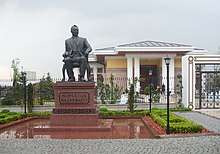
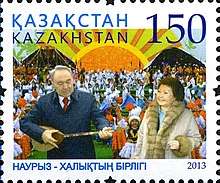
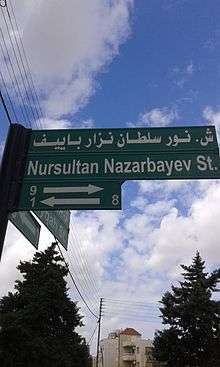
Kazakhstan
- Order of the Golden Eagle[152]
- Medal "Astana"
- Medal "10 Years of the Independence of the Republic of Kazakhstan"
- Medal "10th Anniversary of the Armed Forces of the Republic of Kazakhstan"
- Medal "10th Anniversary of the Constitution of the Republic of Kazakhstan"
- Medal "In Commemoration of the 100th Anniversary of the Railway of Kazakhstan"
- Medal "10 Years of the Parliament of the Republic of Kazakhstan"
- Medal "50 Years of the Virgin Lands"
- Jubilee Medal "60 Years of Victory in the Great Patriotic War 1941-1945"
- Medal "10 Years of the City of Astana"
- Medal "20 Years of the Independence of the Republic of Kazakhstan"
Soviet Union
- Order of the Red Banner of Labour
- Order of the Badge of Honour
- Medal "For the Development of Virgin Lands"
- Jubilee Medal "70 Years of the Armed Forces of the USSR"
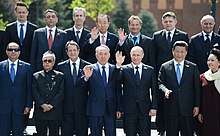
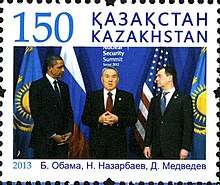
Russian Federation
- Order of St. Andrew the Apostle the First-Called[153]
- Medal "In Commemoration of the 1000th Anniversary of Kazan"
- Medal "In Commemoration of the 300th Anniversary of Saint Petersburg"
- Medal "In Commemoration of the 850th Anniversary of Moscow"
- The Order of Alexander Nevsky[154]
- The Order of Akhmad Kadyrov (Chechnya)
- The Order "For Merits to the Fatherland" (Tatarstan)[155]
Foreign awards
- Afghanistan: Amir Amanullah Khan Award[156]
- Austria: Grand Star of the Decoration of Honour for Services to the Republic of Austria
- Azerbaijan: Heydar Aliyev Order[157]
- Belarus: Order of Friendship of Peoples[158][159]
- Belgium: Grand Cordon of the Order of Leopold
- China: Order of Friendship[160][161]
- Croatia: Grand Order of King Tomislav
- Egypt: Grand Cordon of the great Order of the Nile
- Estonia: Collar of the Order of the Cross of Terra Mariana
- Finland: Commander Grand Cross with Collar of the Order of the White Rose of Finland
- Finland: Commander Grand Cross of the Order of the Lion of Finland
- France: Grand Croix of the Légion d'honneur
- Greece: Grand Cross of the Order of the Redeemer
- Hungary: Order of Merit of the Republic of Hungary
- Italy: Knight Grand Cross with Collar of the Order of Merit of the Italian Republic
- Japan: Order of the Chrysanthemum[162]
- Kyrgyzstan: Golden Order in honor of the 1000th anniversary of Manas[163]
- Latvia: 1st Class with Chain of the Order of the Three Stars[164]
- Lithuania: Grand Cross of the Order of Vytautas the Great (5 May 2000)[165]
- Luxembourg: Grand Cross of the Order of the Oak Crown
- Monaco: Grand Cross of the Order of Saint-Charles[166]
- Poland: Order of the White Eagle
- Qatar: Order of Independence
- Romania: Sash of the Order of the Star of Romania
- Serbia: Order of the Republic of Serbia[167][168]
- Slovakia: Grand Cross (or 1st Class) of the Order of the White Double Cross (2007)[169]
- Spain: Knight Collar of the Order of Isabella the Catholic (2017)[170]
- Tajikistan: Order of Ismoili Somoni
- Turkey: First Class of the Order of the State of Republic of Turkey (22 October 2009)[171]
- United Kingdom: Honorary Knight Grand Cross of the Order of St Michael and St George
- Ukraine: Order of Liberty (Ukraine)
- Ukraine: Order of Prince Yaroslav the Wise, 1st Class
- United Arab Emirates: Order of Zayed
Other
See also
- Counter-terrorism in Kazakhstan
- Government of Kazakhstan
- List of national leaders
- Politics of Kazakhstan
- Acmetal
Notes
- Kazakhstan declared independence from the Soviet Union on 16 December 1991.
- In Kazakh, his name is spelled Нұрсұлтан Әбішұлы Назарбаев in Cyrillic; Nursultan Ábishuly Nazarbaev in Latin and pronounced [nʊrsʊlˈtɑn æbəɕʊˈlə nɑzɑɾˈbɑjɪf]. In Russian, his name is Нурсултан Абишевич Назарбаев, Nursultan Abishevich Nazarbayev, pronounced [nʊrsʊɫˈtan ɐˈbʲiʂɨvʲɪtɕ nəzɐrˈbajɪf].
- Etymology of elbasy: in Turkic languages, 'el'/'il' means 'the people', 'nation', '(home)land', etc., and 'bas'/'bash' means 'head' (both literally and in the meaning of 'leader'). A similar historical title is Ilkhan.
References
- Specific
- Mesquita, Bruce Bueno de (14 January 2013). Principles of International Politics – Bruce Bueno de Mesquita – Google Books. ISBN 9781483304663. Archived from the original on 3 June 2016. Retrieved 21 August 2014.
- "Background on Nursultan Nazarbayev". Carnegie Endowment for International Peace. Archived from the original on 27 March 2019. Retrieved 27 March 2019.
The republic's Supreme Soviet elected Nazarbayev president of the Kazakh SSR on April 24, 1990.
- "Veteran Kazakh leader Nazarbayev resigns after three decades in power". Reuters. 19 March 2019. Archived from the original on 20 March 2019. Retrieved 19 March 2019.
- Walker, Shaun (24 April 2015). "Kazakhstan election avoids question of Nazarbayev successor". The Guardian. ISSN 0261-3077. Archived from the original on 24 September 2016. Retrieved 8 September 2016.
- "Kazakh leader gains crushing election victory". BBC News. 27 April 2015. Archived from the original on 27 March 2019. Retrieved 19 March 2019.
- Pannier, Bruce (11 March 2015). "Kazakhstan's long term president to run in show election – again". The Guardian. Archived from the original on 11 September 2019. Retrieved 13 March 2015.
Nazarbayev has clamped down on dissent in Kazakhstan, and the country has never held an election judged to be free or fair by the West.
- Chivers, C.J. (6 December 2005). "Kazakh President Re-elected; voting Flawed, Observers Say". The New York Times. Retrieved 2 April 2014.
Kazakhstan has never held an election that was not rigged.
- "Kazakh Leader Ready to Devolve Some Powers to Parliament, Cabinet". Voice of America. Archived from the original on 29 January 2017. Retrieved 30 January 2017.
- Nazarbayev 1998, p. 11
- Nazarbayev 1998, p. 16
- Nazarbayev 1998, p. 20
- Nazarbayev 1998, p. 21
- Nazarbayev 1998, p. 22
- Nazarbayev 1998, p. 23
- Nazarbayev 1998, p. 24
- Nazarbayev 1998, p. 26
- Nazarbayev 1998, p. 27
- Nazarbayev 1998, p. 28
- Sally N. Cummings (2002). Power and change in Central Asia. Psychology Press. pp. 59–61. ISBN 978-0-415-25585-1. Archived from the original on 27 May 2013. Retrieved 3 February 2011.
- Nazarbayev 1998, p. 73
- "Union of Soviet Socialist Republics - historical state, Eurasia". Archived from the original on 12 October 2013. Retrieved 24 October 2013.
- Nazarbayev 1998, p. 81
- James Minahan (1998). Miniature empires: a historical dictionary of the newly independent states. Greenwood Publishing Group. pp. 136–. ISBN 978-0-313-30610-5. Archived from the original on 27 May 2013. Retrieved 3 February 2011.
- Nazarbayev 1998, p. 82
- Karen Dawisha; Bruce Parrott (1994). Russia and the new states of Eurasia: the politics of upheaval. Cambridge University Press. pp. 317–318. ISBN 978-0-521-45895-5. Archived from the original on 27 May 2013. Retrieved 3 February 2011.
- Office for Democratic Institutions and Human Rights – Elections. Archived 9 July 2015 at the Wayback Machine
- Holley, David (19 May 2007). "Kazakhstan lifts term limits on long-ruling leader". Los Angeles Times. ISSN 0458-3035. Archived from the original on 10 January 2014. Retrieved 20 March 2019.
- Robert D'A. Henderson (21 July 2003). Brassey's International Intelligence Yearbook: 2003 Edition. Brassey's. p. 272. ISBN 978-1-57488-550-7. Archived from the original on 27 May 2013. Retrieved 3 February 2011.
- "Content". Archived from the original on 6 October 2006. Retrieved 18 February 2007.CS1 maint: BOT: original-url status unknown (link). Retrieved 3 February 2011.
- "Official site of the President of the Republic of Kazakhstan – Astana". Akorda.kz. Archived from the original on 17 March 2015. Retrieved 21 August 2014.
- "January 11. Kazinform's timeline of major events". lenta.inform.kz (in Russian). Archived from the original on 23 March 2018. Retrieved 22 March 2018.
- Aitken, Jonathan (2009). Nazarbayev and the Making of Kazakhstan. London: Continuum. pp. 1–4. ISBN 978-1-4411-5381-4.
- INFORM.KZ (23 September 2016). "Kazakh President amends decree on educational grant for talented youngsters". Kazinform. Archived from the original on 11 October 2016. Retrieved 10 October 2016.
- "Abuse claims swamp Kazakh oil riot trial". BBC. 15 May 2012. Archived from the original on 17 May 2012. Retrieved 16 May 2012.
- "Kazakhstan: Zhanaozen Oil Workers Did Not Take Up Arms". KazWorld.info. 15 December 2016. Archived from the original on 9 November 2017. Retrieved 15 December 2016.
- Flows, Capital. "The Stable State Of Nursultan Nazarbayev's Kazakhstan". Forbes. Archived from the original on 7 November 2017. Retrieved 31 October 2017.
- Witt, Daniel (11 June 2011). "Kazakhstan's Presidential Election Shows Progress". HuffPost. Archived from the original on 13 November 2012. Retrieved 16 March 2015.
- Keene, Eli (21 February 2013). "Kazakhstan 2050 Strategy Leads to Government Restructuring". Carnegie Endowment for International Peace. Archived from the original on 10 November 2017. Retrieved 31 October 2017.
- "WorldViews". The Washington Post. Archived from the original on 5 July 2015. Retrieved 7 September 2017.
- "Kazakhstan: President suggests renaming the country". BBC. 7 February 2014. Archived from the original on 10 July 2014. Retrieved 21 August 2014.
- Martha Brill Olcott (1 September 2010). Kazakhstan: Unfulfilled Promise. Carnegie Endowment. pp. 27–28. ISBN 978-0-87003-299-8. Archived from the original on 3 June 2016. Retrieved 25 November 2015.
- Seymour M. Hersh (9 July 2001). "The Price of oil". The New Yorker. Archived from the original on 4 March 2016. Retrieved 4 November 2015.
- Peter Baker (11 June 2002). "As Kazakh scandal unfolds, Soviet-style reprisals begin". Chicago Tribune. Archived from the original on 8 December 2015. Retrieved 4 November 2015.
- Casey Michel (7 August 2015). "Kazakhstan Goes After Opposition Media in New York Federal Court". The Diplomat. Archived from the original on 23 October 2015. Retrieved 4 November 2015.
- Danny O'Brien (4 August 2015). "How Kazakhstan is Trying to Use the US Courts to Censor the Net". Electronic Frontier Foundation. Archived from the original on 8 December 2015. Retrieved 4 November 2015.
- Holley, David (19 May 2007). "Kazakhstan lifts term limits on long-ruling leader". Los Angeles Times. Archived from the original on 10 January 2014. Retrieved 2 April 2014.
- July 2018, Aigerim Seisembayeva in Nation on 13 (13 July 2018). "Kazakh President given right to head National Security Council for life". The Astana Times. Archived from the original on 2 April 2019. Retrieved 2 April 2019.
- Holding-Together Regionalism: Twenty Years of Post-Soviet Integration. Libman A. and Vinokurov E. (Palgrave Macmillan, London, 2012, p. 220.)
- "Президент Республики Казахстан Н. А. Назарбаев о евразийской интеграции. Из выступления в Московском государственном университете им. М. В. Ломоносова 29 марта 1994 г." Archived from the original on 23 September 2015. Retrieved 25 December 2015.
- Alexandrov, Mikhail. Uneasy Alliance: Relations Between Russia and Kazakhstan in the Post-Soviet Era, 1992-1997. Greenwood Press, 1999, p. 229. ISBN 978-0-313-30965-6
- "Russia, Belarus, Kazakhstan sign 'epoch' Eurasian Economic Union". RT. Archived from the original on 3 July 2014. Retrieved 2 June 2014.
- "Nazarbayev named "Honorary Chairman" of Supreme Eurasian Economic Council". Kazinform. 29 May 2019. Archived from the original on 29 May 2019. Retrieved 29 May 2019.
- "Strategy 2050: Kazakhstan's Road Map to Global Success". EdgeKZ. Archived from the original on 13 January 2014. Retrieved 25 January 2014.
- "Kazakhstan's Nurly Zhol and China's Economic Belt of the Silk Road: Confluence of Goals". The Astana Times. Archived from the original on 11 October 2017. Retrieved 31 October 2017.
- "Digital Kazakhstan initiative presented at Web Summit 2017". The Astana Times. Archived from the original on 31 January 2018. Retrieved 30 January 2018.
- Nazarbayev 1998, p. 42
- Nazarbayev 1998, p. 41
- "NTI Kazakhstan Profile". Nuclear Threat Initiative (NTI). Archived from the original on 24 February 2016. Retrieved 28 July 2013.
- "Kazakhstan and US Renew Nonproliferation Partnership". thediplomat.com. Archived from the original on 23 April 2016. Retrieved 2 May 2016.
- Nazarbayev 1998, p. 141
- Nazarbayev 1998, p. 143
- Nazarbayev 1998, p. 142
- Nazarbayev 1998, p. 150
- Right time for building global nuclear security. Chicago Tribune (11 April 2010). Retrieved 3 February 2011. Archived 10 July 2015 at the Wayback Machine
- "CENTRAL ASIA NUCLEAR-WEAPON-FREE-ZONE (CANWFZ)". Nuclear Threat Initiative. Archived from the original on 20 June 2019. Retrieved 19 March 2019.
- oped Archived 27 March 2014 at the Wayback Machine, The Washington Times
- "Manifesto: The World. The 21st century". akorda.kz. Archived from the original on 1 July 2016. Retrieved 7 June 2016.
- "Manifest by Kazakh President Calls for Global Nuclear Disarmament, Steps to End Global Conflicts". Astana Times. Archived from the original on 13 May 2016. Retrieved 7 June 2016.
- "Kazakhstan dismisses alleged anti-Iran comments from president". Archived from the original on 8 March 2008. Retrieved 3 January 2007.CS1 maint: BOT: original-url status unknown (link). Retrieved 3 February 2011.
- Congress of World Religions – About Congress of leaders of world and traditional religions Archived 7 November 2017 at the Wayback Machine. Religions-congress.org (15 October 2007). Retrieved 3 February 2011.
- Ideology and National Identity in Post-Communist Foreign Policies By Rick Fawn, p. 147
- Moscow's Largest Mosque to Undergo Extension Archived 4 February 2009 at the Wayback Machine
- Preston, Peter (19 July 2009). "How Nursultan became the most loved man on Earth". The Guardian. Archived from the original on 5 March 2017. Retrieved 12 December 2016.
- Leonard, Peter (29 September 2011). "Kazakhstan: Restrictive Religion Law Blow To Minority Groups". HuffPost. Archived from the original on 18 August 2012. Retrieved 21 April 2013.
- "Kazakhstan: Religion Law Restricting Faith in the Name of Tackling Extremism?". EurasiaNet.org. 12 November 2012. Archived from the original on 13 August 2017. Retrieved 21 August 2014.
- Diplomat, Casey Michel, The. "Putin's Chilling Kazakhstan Comments". Archived from the original on 7 March 2016. Retrieved 7 March 2016.
- Traynor, Ian (1 September 2014). "Kazakhstan is latest Russian neighbour to feel Putin's chilly nationalist rhetoric". Archived from the original on 12 January 2017. Retrieved 12 December 2016.
- "Kazakhs Worried After Putin Questions History of Country's Independence". Archived from the original on 7 March 2016. Retrieved 7 March 2016.
- "Vladimir Putin Continues Soviet Rhetoric by Questioning Kazakhstan's 'Created' Independence". 1 September 2014. Archived from the original on 7 March 2016. Retrieved 7 March 2016.
- Trilling, David (30 August 2014). "As Kazakhstan's Leader Asserts Independence, Did Putin Just Say, 'Not So Fast'?". EurasiaNet. Archived from the original on 4 March 2016. Retrieved 7 March 2016.
- Brletich, Samantha. "The Crimea Model: Will Russia Annex the Northern Region of Kazakhstan?". Archived from the original on 17 November 2015. Retrieved 7 March 2016.
- "Russian and Kazakh Leaders Exchange Worrying Statements". Archived from the original on 7 March 2016. Retrieved 7 March 2016.
- "Nazarbayev's Severe Response to Putin". Archived from the original on 24 October 2016. Retrieved 7 March 2016.
- Homepage TR (22 September 2015). "Nazarbayev vs Putin". Archived from the original on 31 October 2018. Retrieved 7 March 2016 – via YouTube.
- Lillis, Joanna (27 January 2016). "Kazakhstan creates its own Game of Thrones to defy Putin and Borat". Archived from the original on 12 December 2016. Retrieved 12 December 2016.
- "New Kazakh TV series a riposte to Putin and Borat". Archived from the original on 11 March 2016. Retrieved 7 March 2016.
- Lillis, Joanna (6 January 2015). "Kazakhstan Celebrates Statehood in Riposte to Russia". EurasiaNet. Archived from the original on 24 January 2016. Retrieved 7 March 2016.
- "Kazakhstan MP responds to Vladimir Putin's statement on lack of statehood in Kazakhstan - Politics - Tengrinews". Archived from the original on 5 October 2015. Retrieved 7 March 2016.
- Najibullah, Farangis (3 September 2014). "Putin Downplays Kazakh Independence, Sparks Angry Reaction". Archived from the original on 10 March 2016. Retrieved 7 March 2016 – via Radio Free Europe / Radio Liberty.
- Michel, Casey (19 January 2015). "Even Vladimir Putin's Authoritarian Allies Are Fed Up With Russia's Crumbling Economy". Archived from the original on 7 March 2016. Retrieved 7 March 2016.
- "Lost in translation? Kazakh leader bans cabinet from speaking Russian Archived 25 May 2018 at the Wayback Machine". Reuters. 27 February 2018.
- Human Rights Watch, World Report 2015: Kazakhstan Archived 28 October 2016 at the Wayback Machine. Retrieved October 2015.
- "World Press Freedom Index 2014". Reporters Without Borders. Archived from the original on 14 February 2014. Retrieved 31 August 2014.
- "Country Reports on Human Rights Practices for 2013: Kazakhstan", released by the Bureau of Democracy, Human Rights and Labor. Retrieved November 1, 2015
- "Rule of Law Index 2015". World Justice Project. Archived from the original on 29 April 2015. Retrieved 5 November 2015.
- "Kazakh President instructs to improve court system". kazinform. Archived from the original on 14 October 2016. Retrieved 13 October 2016.
- "Nazarbayev's trust-based relations with foreign partners help promote Kazakhstan's interests". inform.kz. Archived from the original on 6 July 2016. Retrieved 8 July 2016.
- Gill (30 November 2001). "Shanghai Five: An Attempt to Counter U.S. Influence in Asia?". Brookings.
- "Kazakhstan: Trump talked up leader's 'miracle' in call". The Hill. Archived from the original on 19 January 2017. Retrieved 20 December 2016.
- "PM Netanyahu meets with Kazakhstan President Nursultan Nazarbayev". mfa.gov.il. Archived from the original on 30 December 2016. Retrieved 29 December 2016.
- "Mnangagwa arrives in Kazakhstan". The Zimbabwe Mail. 19 January 2019. Archived from the original on 20 March 2019. Retrieved 20 March 2019.
- "Mohammad Bin Zayed receives President of Kazakhstan". gulfnews.com. Archived from the original on 31 March 2019. Retrieved 31 March 2019.
- "Kazakh President Nazarbaev Abruptly Resigns, But Will Retain Key Roles". RadioFreeEurope/RadioLiberty. Archived from the original on 19 March 2019. Retrieved 19 March 2019.
- Обращение Главы государства Нурсултана Назарбаева к народу Казахстана Archived 19 March 2019 at the Wayback Machine. The official web site of the President of Kazakhstan, 19 March 2019.
- "Shavkat Mirziyoyev Talks with the First President of Kazakhstan on the Phone". president.uz. Archived from the original on 20 March 2019. Retrieved 21 March 2019.
- INFORM.KZ. "Shavkat Mirziyoyev: Nursultan Nazarbayev is a great politician". www.inform.kz.
- Ruptly (20 March 2019). "Russia: Putin praises former Kazakh President Nursultan Nazarbayev" – via YouTube.
- "Official web-site of President of Azerbaijan Republic - NEWS » Press service information". en.president.az. Archived from the original on 21 March 2019. Retrieved 21 March 2019.
- Выступление Президента Республики Казахстан Касым-Жомарта Токаева на совместном заседании палат Парламента Archived 21 March 2019 at the Wayback Machine, 20 March 2019
- "Нур-Султан - новое название столицы Казахстана". Tengrinews.kz. 20 March 2019. Archived from the original on 21 March 2019. Retrieved 20 March 2019.
- "The people of Kazakhstan wonder who their next president will be". The Economist. 11 April 2019. Archived from the original on 12 April 2019. Retrieved 12 April 2019.
- Hess, Max (22 March 2019). "Nazarbayev's Resignation Is an Attempt to Institutionalize His System". The Moscow Times. Archived from the original on 26 March 2019. Retrieved 10 May 2019.
- "Nauryz celebrated throughout the country". The Astana Times. 26 March 2019. Archived from the original on 31 March 2019. Retrieved 10 May 2019.
- Auyezov, Olzhas (29 April 2019). "Kazakhs, foreign investors puzzled by power-sharing leaders". Reuters. Archived from the original on 10 May 2019. Retrieved 10 May 2019.
- April 2019, Malika Orazgaliyeva in International on 27 (27 April 2019). "Kazakhstan has turned into 'competitive transit hub', Nazarbayev tells Belt and Road forum". Retrieved 3 January 2020.
- Matthew Luxmoore. "Russia Marks WWII Victory Day With Military Parades, Commemorative Marches". www.rferl.org. Archived from the original on 10 May 2019. Retrieved 10 May 2019.
- Xu Wei: Kazakhstan's first president awarded Friendship Medal for contributions Archived 10 May 2019 at the Wayback Machine, China Daily 29 April 2019. Accessed on 11 September 2019.
- "Former Kazakh president made honorary head of Turkic Council". DailySabah. Archived from the original on 26 May 2019. Retrieved 26 May 2019.
- "Meeting with Nursultan Nazarbayev". President of Russia. Archived from the original on 9 September 2019. Retrieved 8 September 2019.
- "Official web-site of President of Azerbaijan Republic - NEWS » Meetings". en.president.az. Retrieved 3 July 2020.
- "Archived copy". Archived from the original on 23 October 2019. Retrieved 23 October 2019.CS1 maint: archived copy as title (link)
- "Archived copy". Archived from the original on 23 October 2019. Retrieved 23 October 2019.CS1 maint: archived copy as title (link)
- "Archived copy". Archived from the original on 23 October 2019. Retrieved 23 October 2019.CS1 maint: archived copy as title (link)
- "Archived copy". Archived from the original on 23 October 2019. Retrieved 23 October 2019.CS1 maint: archived copy as title (link)
- "Archived copy". Archived from the original on 23 October 2019. Retrieved 23 October 2019.CS1 maint: archived copy as title (link)
- "Archived copy". Archived from the original on 29 October 2019. Retrieved 29 October 2019.CS1 maint: archived copy as title (link)
- "Archived copy". Archived from the original on 29 October 2019. Retrieved 29 October 2019.CS1 maint: archived copy as title (link)
- "Archived copy". Archived from the original on 6 November 2019. Retrieved 6 November 2019.CS1 maint: archived copy as title (link)
- "Nazarbayev named honorary chair of Central Asian Consultative Meeting, proposes solidifying cooperation". astanatimes.com. Archived from the original on 11 December 2019. Retrieved 13 December 2019.
- "Nazarbayev's Biz Birgemiz Fund Dedicates Funds to Help 80,000 Struggling Rural Families". The Astana Times.
- https://elbasy.kz/en/news/2020-06/telegram-addressed-nursultan-nazarbayev-king-jordan-abdullah-ii
- https://elbasy.kz/en/news/2020-06/telegram-addressed-nursultan-nazarbayev-ex-president-croatia-stefan-mesic
- https://www.inform.kz/en/nursultan-nazarbayev-addresses-people-of-kazakhstan_a3668657
- INFORM.KZ (5 July 2020). "President of Armenia congratulates Nursultan Nazarbayev on his 80th birthday". www.inform.kz (in Russian). Retrieved 5 July 2020.
- July 2020, Mintimer Shaimiev in Op-Ed on 2 (2 July 2020). "Nursultan Nazarbayev: Looking Back At a Legacy of Friendship and Cooperation With Tatarstan". The Astana Times. Retrieved 5 July 2020.
- https://elbasy.kz/ru/news/2020-07/telefonnyy-razgovor-s-eks-prezidentom-tureckoy-respubliki-abdulloy-gyulem
- Andrei Beloborodov in International on 4 July 2020 (4 July 2020). "Nazarbayev's Legacy: Forging a Path For an Independent Kazakhstan as a Leader in Central Asia". The Astana Times. Retrieved 5 July 2020.
- https://astanatimes.com/2020/07/capital-day-celebrations-will-be-held-virtually-this-year/
- "В Нур-Султане открыли памятник Назарбаеву, облаченный в военную форму. Видео". Sputnik Кыргызстан (in Russian). Retrieved 5 July 2020.
- "Новый памятник Назарбаеву открыли в канун его 80-летия в столице". Радио Азаттык (in Russian). Retrieved 5 July 2020.
- "BBC News | Asia-Pacific | Central Asia's 'perfect couple' wed". news.bbc.co.uk. Archived from the original on 20 March 2019. Retrieved 13 May 2019.
- "Archived copy". Archived from the original on 29 October 2019. Retrieved 29 October 2019.CS1 maint: archived copy as title (link)
- "Болат Назарбаев судится в Америке со своей бывшей женой". Archived from the original on 9 April 2016. Retrieved 27 March 2019.
- Семья президента: Нурсултан Назарбаев. Рамблер/новости (in Russian).
- Тұңғыш Президенттің балалық шағы. 2011. Retrieved 26 March 2019.
- Kazakhstan: Nazarbayev diagnosed with coronavirus, at Eurasianet; published June 18, 2020; retrieved June 18, 2020
- "Nazarbayev Recovers From Coronavirus, Back On His Feet After Three Weeks". The Astana Times.
- "Внук Назарбаева заявил, что он — не внук, а сын". EADaily (in Russian). Retrieved 17 August 2020.
- "Nursultan Nazarbayev's grandson claims somebody wants to kill him". akipress.com. Retrieved 17 August 2020.
- "Kazakhstan: Troubled Nazarbayev grandson dies aged 29 | Eurasianet". eurasianet.org. Retrieved 17 August 2020.
- "Указ Президента Республики Казахстан от 20 марта 2019 года № 1 "О присвоении звания "Халық Қаhарманы" Назарбаеву Н. А."". Archived from the original on 7 August 2019. Retrieved 8 August 2019.
- "Указ Президента Российской Федерации от 12 октября 1998 года № 1212 "О награждении орденом Святого апостола Андрея Первозванного Назарбаева Н. А."". Archived from the original on 29 October 2013. Retrieved 6 December 2010.
- "Указ Президента Российской Федерации от 8 июня 2015 года № 290 "О награждении орденом Александра Невского Назарбаева Н. А."". Archived from the original on 8 August 2019. Retrieved 8 August 2019.
- "Встреча с Президентом Республики Татарстан Рустамом Миннихановым". Archived from the original on 8 August 2019. Retrieved 8 August 2019.
- "Участие во встрече с лидерами БРИКС". Archived from the original on 8 August 2019. Retrieved 8 August 2019.
- "Распоряжение Президента Азербайджанской Республики о награждении Нурсултана Назарбаева орденом "Гейдар Алиев"". Archived from the original on 8 October 2017. Retrieved 8 August 2019.
- "Указ Президента Республики Беларусь от 19 июня 2015 года № 250 "О награждении"". Archived from the original on 6 March 2019. Retrieved 8 August 2019.
- "Лукашенко наградил Назарбаева орденом Дружбы народов". Archived from the original on 8 August 2019. Retrieved 8 August 2019.
- "Си Цзиньпин наградил Назарбаева Орденом дружбы". Archived from the original on 29 April 2019. Retrieved 8 August 2019.
- Nursultan Nazarbayev awarded the Order of Friendship of the People's Republic of China Archived 13 May 2019 at the Wayback Machine, Official Site of the President of the Republic of Kazakhstan 28 April 2019. Accessed on 11 September 2019.
- Official statements by the Embassy of the Republic of Kazakhstan in Japan
- Указ Президента Киргизской Республики от 28 августа 1995 года УП № 204 «О вручении памятного золотого ордена „Манас-1000“ и памятной золотой медали Назарбаеву Нурсултану Абишевичу Президенту Республики Казахстан»
- "President of the Latvian Republic Valdis Zatlers Pays His First Official Visit to Kazakhstan at President Nursultan Nazarbayev' s Invitation — Official site of the President of the Republic of Kazakhstan". Akorda.kz. Archived from the original on 27 March 2019. Retrieved 27 March 2019.
- Lithuanian Presidency Archived 19 April 2014 at the Wayback Machine, Lithuanian Orders searching form
- "Ordonnance Souveraine n° 4.491 du 27 septembre 2013 portant élévation dans l'Ordre de Saint-Charles". Archived from the original on 8 August 2019. Retrieved 8 August 2019.
- Т.Николич вручил Н.Назарбаеву Орден Республики Сербия
- "Встреча с Президентом Республики Сербия Александром Вучичем". Archived from the original on 7 August 2019. Retrieved 8 August 2019.
- Slovak republic website, State honours Archived 13 April 2016 at the Wayback Machine: 1st Class in 2007 (click on "Holders of the Order of the 1st Class White Double Cross" to see the holders' table)
- "Spanish Official Journal. Royal Decree 677/2017, 23 june". Archived from the original on 7 November 2017. Retrieved 26 July 2017.
- "Presidency of the Republic of Turkey (Photo)". Archived from the original on 22 March 2014. Retrieved 21 August 2014.
- "Declaration" (in Russian). qurultai.org. Archived from the original on 5 November 2017. Retrieved 9 July 2017.
- General
- Nazarbayev, Nursultan (1998), Nursultan Nazarbayev: My Life, My Times and My Future..., Pilkington Press, ISBN 1899044191
External links
| Wikimedia Commons has media related to Nursultan Nazarbayev. |
| Political offices | ||
|---|---|---|
| Preceded by Bayken Ashimov |
Prime Minister of the Kazakh Soviet Socialist Republic 1984–1989 |
Succeeded by Uzaqbay Qaramanov |
| Preceded by Kilibay Medeubekov |
Chairman of the Supreme Soviet of the Kazakh Soviet Socialist Republic 1990 |
Succeeded by Yerik Asanbayev |
| New office | President of Kazakhstan 1991–2019 |
Succeeded by Kassym-Jomart Tokayev (interim) |
| Chairman of the Security Council of Kazakhstan 1991–present |
Incumbent | |
| Party political offices | ||
| Preceded by Gennady Kolbin |
First Secretary of the Central Committee of the Communist Party of Kazakhstan 1989–1991 |
Party dissolved |